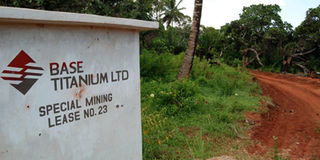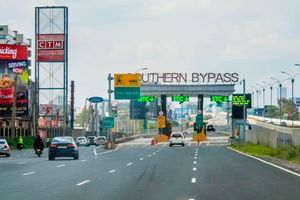Titanium firm wins road levy row with Mombasa

A sign outside a Base Titanium site in Kwale.
Mombasa County government is staring at a huge dip in revenue collection after the Supreme Court nullified the decision to impose tax on the Base Titanium trucks transporting minerals from Kwale County to the Mombasa port.
The apex court said the cess of Sh3,000 imposed upon each truck ferrying the mineral to the port is unconstitutional, null and void. The cess was imposed by Governor Hassan Joho's administration in June 17, 2014.
The court also paved way for the mineral sands operator -Base Titanium Limited -to pursue a refund of any monies paid to the devolved unit from January 1, 2015.
In addition, the five-judge bench led by Deputy Chief Justice Philomena Mwilu directed the county government to refund the company, which commenced the production of the mineral in Kwale in late 2013, the sum of Sh1,542,000 paid as cess as of December 31, 2014.
The other judges in the bench that rendered the ruling on Friday include Justices Mohamed Ibrahim, Smokin Wanjala, Njoki Ndung'u and Isaac Lenaola.
While ruling on an appeal filed by the mineral operator challenging the decision of the appellate court to dismiss its petition, the judges declared that the actions of Mombasa government to charge the cess or any sum at all, a condition for the titanium company to move its goods across the boundaries of Mombasa county is unconstitutional, null and void.
The Apex court found that the road used by the trucks transporting the Base Titanium's company goods to the port is not a county road, but rather a national road under maintenance of the Kenya National Highway Authority (KENHA).
As a result, they said should an access fee be owing, then the proper entity to which that amount is owed should be the national government not the county government.
"It is not in dispute that to access the port, the Appellant must use the Likoni-Ukunda Road which the Kenyan road system identifies as an A14 road. Going by the background and network system, that road falls directly into the category of a national road.
That category falls directly under the mandate of KeNHA and the national government which is in charge of its development, rehabilitation, management and maintenance," said the judges.
Having established that it is not a county road, the court ruled that it is then improper for county government of Mombasa to levy a charge for road service for the same road that vests in the national government.
It was noted that the Mombasa county government did not clarify how the charge meets the categories it had set out in one of the items in the County Finance Act, 2014.
"They have not stated if they provide street lighting, parking or maintenance of the road accessed by the Base Titanium Ltd. While the superior courts (High court and Appeals court) were in agreement with them that the charge was a ‘road service’ charge, we are of a contrary opinion, as the Mombasa county government did not illustrate how such road services are provided," ruled the Supreme Court.
Further, the court noted that in issuing receipts marked ‘miscellaneous income’ or ‘Likoni Revenue Barrier’, the county government did not disclose the nature nor details of the payment.
"In plain language, Article 201 (a) of the Constitution of Kenya calls for openness and accountability including public participation in financial matters. It is not lost to us the intention of this provision is to ensure efficiency within the public financial management sector which has faced tremendous challenges occasioned by gaps that has resulted in the past embezzlement of public funds," said the judges.
This Article, they stated, seeks to curb the problem of abuse of public resources and corruption, by calling for transparency in the handling of these resources. They emphasized that public finances should be managed efficiently with firm checks and balances.
"It is clear to us that in issuing receipts marked ‘miscellaneous income’ the county government of Mombasa has created avenues for possible abuse. Using the term “miscellaneous” to account for payment leads to ambiguity which goes against the spirit of Article 201 of the Constitution. That word could refer to any number of things and it is essential that this form of opaqueness in accountability be discouraged," stated the court.
It held that it is imperative that any payments to counties must clearly state in precise, unambiguous words what the payments are for.
The court faulted both the High Court and Court of Appeal for their interpretation and application of Article 209(4) of the Constitution in their finding that the cess levied by the was in line Constitution. Article 209(4) on power to impose taxes and charges says 'the national and county governments may impose charges for services'.
According to the Supreme judges, whereas a county government can levy charges, it must do so in exchange for an amenity. Put differently, they said, a county government does not have the authority to charge a cess, levy or tax where they do not offer anything in return.
They stated that the county government's power to impose charges and levies does not go unchecked.
"In the spirit of harmonious interpretation of the Constitution, in enacting the law, county governments must heed the provisions of Article 209 (5) and ensure that the charges invoked will not be detrimental to national economic policies, economic activities across boundaries or the national mobility of goods, services, capital or labor," said the judges.





